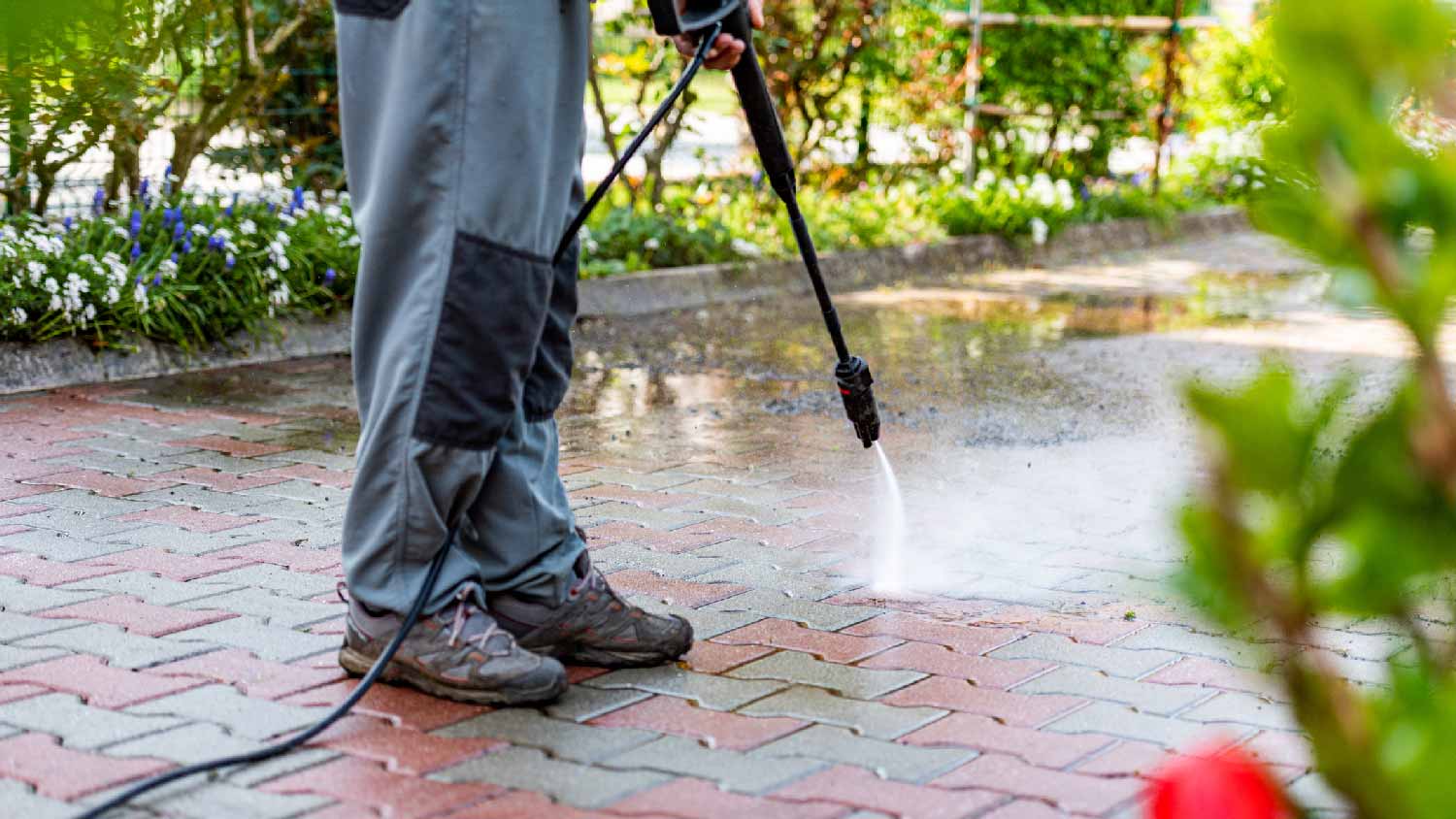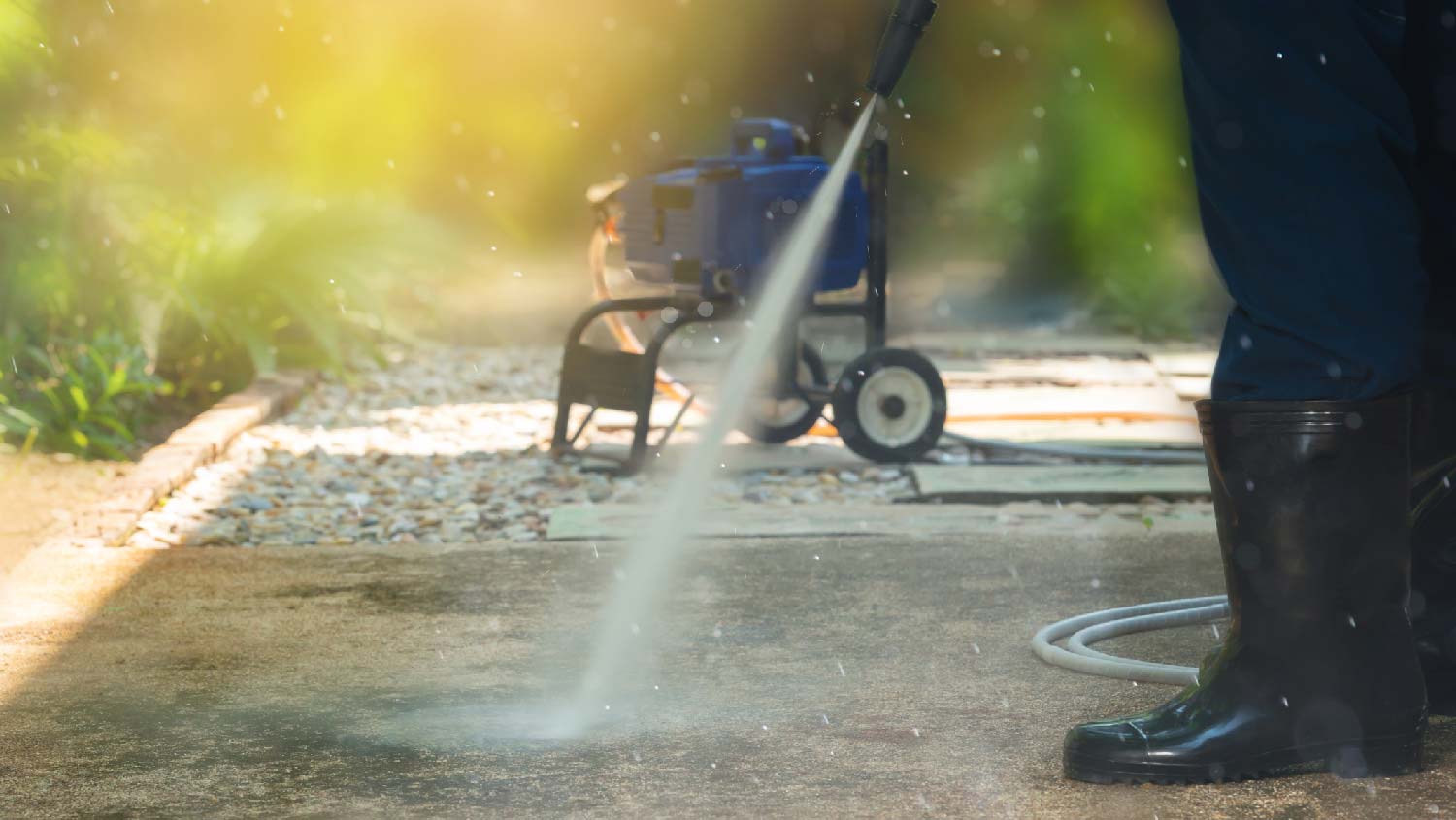Alternatives to Bleach for Pressure Washing
Pressure washing without bleach is possible


While bleach is powerful against mold and mildew, its abrasiveness and reactivity make it a poor choice for pressure washing many different types of outdoor surfaces.
There are many organic and gentle options that are appropriate for glass, concrete, and other materials.
While some bleach alternatives for pressure washing may be safe and natural, they have properties that can damage a pressure washer.
If you don't like the idea of using bleach around your home, you may be wondering if there's a good alternative cleaning agent when pressure washing your house's exterior. Luckily, there are several gentler options that can also remove dirt and grime. Keep reading to find the right bleach alternative for pressure washing.
Reasons to Skip Bleach When Pressure Washing Your Home
Relying on bleach by default is one of the most common pressure washing mistakes. Bleach is commonly used to wash the exteriors of homes because it's powerful when it comes to killing mold and mildew. However, using bleach can do more harm than good over time. Bleach can wreck wood decks and other delicate surfaces around the home. It also corrodes metals.
Bleach can also be devastating for landscaping. Bleach that sprays and drips can kill or damage the plants, flowers, and shrubs surrounding your home. There's also a risk that pets or neighborhood animals will ingest bleach that ends up on the grass. Due to its corrosive nature, bleach can also corrode nozzles and seals on your pressure washer. Finally, there is a risk that bleach will get on your skin and clothing. That's why protecting your skin from exposure to any kind of cleaning agent is one of the most important pressure washing tips.
Alternative #1: Vinegar
Many people have made the switch to vinegar when cleaning interior parts of a home because of its reputation for being a safe, natural cleaner. Vinegar's incredible dirt-lifting power can also be great when pressure washing the exterior of your home. Vinegar is completely nontoxic for humans and pets. It is also safe to use on all types of surfaces. Based on your pressure washing frequency, vinegar may be the best option for avoiding the degradation and corrosion that can occur with harsher products.
Prepping to paint the exterior of your home soon? Because it's strong and safe to use, vinegar is one of the most popular options for use in pressure washing your home before a fresh paint job.
"Make sure you know your home's siding material before power washing. For example, what you think is stucco could really be styrofoam with a thin layer of concrete on top. This can be damaged easily with pressure washing."
— Fred Hodge, President and Co-Founder at Clearview Washing, Little Silver, New Jersey
Alternative #2: Citric Acid

Citric acid is an organic cleaner that is great for removing stubborn stains and mineral deposits. People regularly use citric acid to make sidewalks, driveways, patios, and other concrete areas look brand new. It also works great on wood.
Alternative #3: Ammonia
Ammonia can be a good option for outdoor pressure washing because fresh air provides plenty of ventilation. While not as versatile as other bleach alternatives for pressure washing, ammonia does have some great uses. Ammonia is especially good for pressure washing exterior glass and windows.
Alternative #4: Chlorine

If you're looking for a bleach alternative for pressure washing that's as close as possible to bleach, chlorine is the top pick. The advantage of chlorine is that it contains fewer chemicals beyond its based compound of sodium hypochlorite. Chlorine is powerful when it comes to removing oil and embedded stains from concrete. However, it does require a similar level of caution as bleach due to the fact that it can destroy wood.
Alternative #5: Dish Soap
You may hear people say that they've used everyday dish soap as a bleach alternative for pressure washing different types of gutters. While this does provide a very mild and safe cleaning option, it's not necessarily the best choice. The sudsy quality of dish soap can cause foam to build up on the area you're cleaning. Once suds start foaming up, it can be nearly impossible to get them rinsed away. What's more, dish soap is very likely to gum up the interior of a pressure washer.





- How to Dispose of Bleach Safely and Responsibly
- Can You Pour Bleach Down the Drain? Is It Safe?
- How Long Does Bleach Last? Here’s the Average Lifespan
- The 10 Biggest Benefits of Pressure Washing Your Home
- Can You Pressure Wash Wood? What to Know Before You Start Spraying
- Pressure Washing Siding: Everything Homeowners Need to Know
- Pros and Cons of DIY Pressure Washing
- Soft Washing vs. Pressure Washing: When to Use Each Method
- How Often to Pressure Wash Your House to Keep It Pristine
- 12 Common Pressure Washing Mistakes and How to Avoid Them










